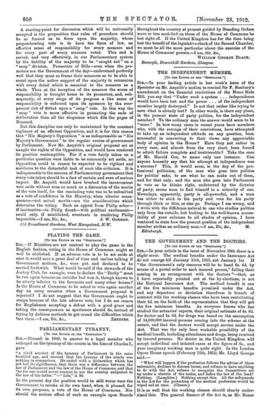THE INDEPENDENT MEMBER, [To THE EDTTOR OP THE " SPECTATOR:1
SIR,—In your leading article in last week's issue of the Spectator on Mr. Asquith's motion to rescind Sir F. Banbury's amendment on the financial resolutions of the Home Rule Bill, you say that " Under such a system . . . independence would have been lost and the power . . . of the independent member largely destroyed." Is not that rather like trying to save what is already lost ? In other words, is there any place, in the present state of party politics, for the independent member? To the ordinary man the answer would seem to be "none." In how many cases in recent years have members who, with the courage of their convictions, have attempted to take up an independent attitude on any question, been successful in converting to their views any appreciable body of opinion in the House P Have they not rather in every case, and almost from the very start, been forced to admit failure complete and irretrievable P Take the case of Mr. Harold Cox, to name only one instance. Can anyone honestly say that his attempt at independence was a success This, it would seem, is the day of the pro- fessional politician, of the man who goes into politics for politics' sake, to see what he can make out of them, and for that only ; and the man who goes into Parliament to vote as he thinks right, undeterred by the dictates of party, seems soon to find himself in a minority of one. Nowadays, apparently, party is all-powerful, and a man has either to stick to his party and vote for his party through thick or thin, or else go. Perhaps I am wrong, and I write with the diffidence natural to one who studies politics only from the outside, but looking to the well-known access- ibility of your columns to all shades of opinion, I have ventured to state how the present position of the independent
member strikes an ordinary man.—I am, Sir, &c., M.
Edinburgh.














































 Previous page
Previous page